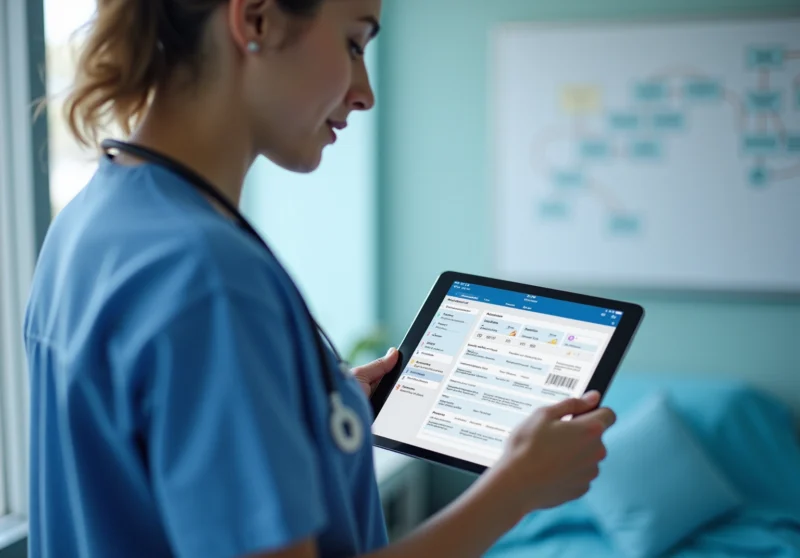
Customer Relationship Management (CRM) in healthcare is essential for enhancing patient engagement and streamlining medical operations.
Specialized software tailored to the unique needs of healthcare providers centralizes client data, improves communication, and automates administrative processes.
This comprehensive approach not only leads to better patient care but also significantly boosts operational efficiency.
By implementing effective CRM strategies, healthcare organizations can address critical challenges and foster a more patient-centered environment.
The healthcare landscape is undergoing a significant transformation, driven by the pressing need for improved patient engagement and operational efficiency. Customer Relationship Management (CRM) systems, specifically tailored for medical settings, are emerging as essential tools. These systems not only streamline administrative tasks but also enhance the quality of care provided to patients.
As the demand for personalized healthcare solutions continues to grow, one must consider: how can CRM systems redefine the patient-provider relationship and address the unique challenges faced by healthcare professionals today?
The crm definition medical involves Customer Relationship Management (CRM) in the medical field, which includes specialized software applications designed to enhance interactions with individuals and streamline medical operations. Unlike traditional CRM platforms that primarily focus on sales and marketing, the crm definition medical shows that medical CRMs are specifically tailored to meet the unique needs of healthcare providers. These frameworks ensure compliance with medical regulations while significantly improving user engagement.
Healthcare CRMs consolidate client data, manage appointment scheduling, and facilitate seamless communication between providers and clients. This integration is crucial, especially considering that the U.S. medical system recorded 34 million hospital admissions in 2023, underscoring the need for effective management tools for individuals. The crm definition medical highlights how centralizing client information empowers healthcare providers to deliver personalized care, ultimately enhancing outcomes and operational efficiency.
The impact of CRM systems on client engagement is substantial. They not only keep individuals informed about appointments and medication reminders but also support personalized outreach strategies, fostering stronger relationships between providers and individuals. As the American geriatric population is projected to increase from 58 million in 2022 to 82 million by 2050, the demand for effective engagement solutions will undoubtedly rise.
Expert opinions underscore the importance of the CRM definition medical software in enhancing client engagement. For instance, leading market research experts emphasize that as much as 95% of profits for large medical organizations stem from long-term clients, making CRM solutions vital for maintaining these relationships. Furthermore, the anticipated expansion of the medical market, under the crm definition medical, is expected to reach USD 18.76 billion by 2025, driven by escalating client engagement initiatives and digital transformation within medical services.
In conclusion, medical CRM platforms are indispensable tools that not only streamline administrative processes but also elevate patient engagement, ultimately leading to improved care delivery and operational success.

The crm definition medical highlights that the development of CRM systems in the medical field can be traced back to the late 1980s and early 1990s, during which the primary focus was on managing customer interactions across various sectors. As the medical field transitioned to a more consumer-driven model, the demand for specialized solutions became increasingly evident. By the early 2000s, medical organizations began to recognize the vital role of managing client relationships, as highlighted in the crm definition medical, to enhance satisfaction and health outcomes.
Today, the crm definition medical includes leveraging advanced technologies, such as artificial intelligence and data analytics, allowing providers to personalize client interactions and streamline administrative processes. This evolution signifies a substantial shift towards patient-centered care.
Inferscience’s API solution exemplifies this transformation by addressing medical interoperability challenges, facilitating seamless HCC coding data exchange among providers, payers, and third-party vendors. Furthermore, the Claims Assistant tool enhances this process by conducting real-time gap analysis on claims files, recommending potentially overlooked HCC codes to improve billing accuracy and providing a clearer perspective on conditions.
The global CRM definition medical market is projected to reach $30.65 billion by 2030, underscoring the growing importance of these platforms in enhancing user engagement and operational efficiency.

Healthcare CRM platforms are vital in understanding the crm definition medical to address the challenges faced by medical professionals today. Equipped with essential features such as client data management, appointment scheduling, communication tools, and analytics, these platforms enable the centralization of client information, monitoring of interactions, and automation of follow-ups. This significantly enhances operational efficiency.
The advantages of adopting these systems are numerous. Not only do they enhance individual engagement, but they also streamline workflows and improve adherence to healthcare regulations. For instance, automated appointment reminders can decrease no-show rates by almost 70%. Moreover, robust data analytics empower providers to identify trends in care, ultimately leading to improved health outcomes.
A prime example of this innovation is Inferscience’s Care Gaps app. This application allows users to upload care gaps, automatically analyze the information, and review suggested gaps within their EHR. This process streamlines the identification and closure of clinical care gaps, showcasing the practical benefits of healthcare as defined in the crm definition medical.
Furthermore, efficient medical database management frameworks enhance client care and operational effectiveness by facilitating seamless exchanges of information across various touchpoints in a client’s care plan. This ultimately aids in better decision-making and fosters enhanced client outcomes.
In the medical field, the CRM definition medical highlights that CRM platforms are indispensable, significantly enhancing both patient care and operational efficiency. They provide a comprehensive view of client interactions and preferences, enabling healthcare providers to deliver personalized care that meets individual needs. Moreover, CRMs streamline administrative tasks, empowering medical staff to dedicate more time to patient interactions rather than paperwork. This increased efficiency not only boosts patient satisfaction but also optimizes resource allocation, resulting in improved health outcomes and reduced operational costs.
For example, automated client feedback collection can effectively measure satisfaction levels, while customizable dashboards allow healthcare organizations to focus on vital metrics such as client retention. Ultimately, the integration of CRM systems, as outlined in the CRM definition medical, cultivates a more efficient healthcare environment, where providers can prioritize patient care while effectively managing resources.

The integration of Customer Relationship Management (CRM) systems in healthcare is fundamentally reshaping how medical providers interact with patients and manage operations. The definition of CRM in the medical context underscores the tailored functionality of these systems, which not only streamline administrative tasks but also cultivate more meaningful relationships between healthcare providers and patients. By enhancing user engagement and ensuring compliance with medical regulations, CRMs have become essential tools for delivering personalized care.
Key points throughout this discussion highlight the evolution of CRM systems, their critical features, and the substantial benefits they offer to healthcare settings. From the historical development of these systems to their advanced capabilities in managing client data and improving communication, it is evident that the role of CRM in healthcare is pivotal. The anticipated growth of the medical CRM market further underscores the increasing demand for effective engagement solutions, particularly as patient populations continue to expand and evolve.
In light of these insights, embracing CRM technology in healthcare is not merely a trend; it is a necessity for enhancing patient care and operational efficiency. As the industry progresses, healthcare providers must prioritize the adoption of these systems to meet the unique needs of their patients and improve overall health outcomes. The future of healthcare lies in leveraging technology to create a more connected and efficient environment, where patient-centered care is at the forefront of every interaction.